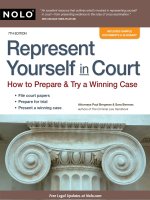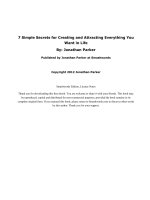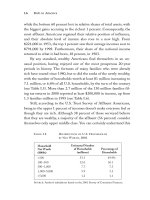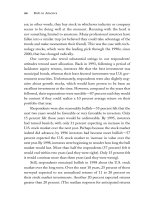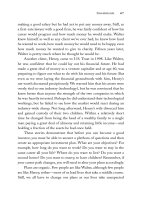Rich in America Secrets to Creating and Preserving Wealth PHẦN 2 docx
Bạn đang xem bản rút gọn của tài liệu. Xem và tải ngay bản đầy đủ của tài liệu tại đây (194.94 KB, 28 trang )
while the bottom 60 percent lost in relative shares of total assets, with
the biggest gains accruing to the richest 1 percent. Consequently, the
most affluent Americans regained their relative position of influence,
and their absolute level of income also rose to a new high. From
$221,000 in 1953, the top 1 percent saw their average incomes soar to
$791,000 by 1998. Furthermore, their share of the national income
returned to what it had been, 18 percent, in 1903.
By any standard, wealthy Americans find themselves in an un-
usual position, having enjoyed one of the most prosperous 20-year
periods in history. The fortunes of many families who were already
rich have soared since 1980, but so did the ranks of the newly wealthy,
with the number of households worth at least $1 million increasing to
7.1 million, or 6.6% of all U.S. households, by the turn of the century
(see Table I.5). More than 2.7 million of the 130 million families fil-
ing tax returns in 2000 reported at least $200,000 in income, up from
1.3 families million in 1995 (see Table I.6).
Still, according to the U.S. Trust Survey of Affluent Americans,
being in the upper 1 percent of incomes doesn’t make everyone feel as
though they are rich. Although 38 percent of those surveyed believe
that they are wealthy, a majority of the affluent (56 percent) consider
themselves only upper middle class. You can certainly understand this
16 Rich in America
TABLE I.5 DISTRIBUTION OF U.S. HOUSEHOLDS
BY
NET WORTH, 2001
Household
Net Worth
($000s)
Estimated Number
of Households
(millions)
Percentage of
Households
<100
100−500
500−1,000
1,000−5,000
>5,000
53.1
32.0
7.7
5.9
1.2
49.9%
30.1
7.3
5.5
1.1
SOURCE: Author’s tabulations based on the 2001 Survey of Consumer Finances.
00 Intro Maurer 6/20/03 4:53 PM Page 16
if you live in New York, Chicago, or Los Angeles and earn around
$300,000 a year—you don’t feel rich. And 5 percent still think of them-
selves as middle class.
By the beginning of this century, even the super affluent have suf-
fered a reversal of fortune as shown by the drop in the aggregate new
worth of the Forbes 400 (see Figure I.2).
Introduction 17
0
250
500
750
1,000
1,250
1982 1983 1984 1985 1986 1987 1988 1989 1990 1991 1992 1993 1994 1995 1996 1997 1998 1999 2000 2001 2002
Billions of dollars
Forbes magazine has tracked the aggregate
net worth of the nation's wealthy since 1982.
The start of the 21st century marked the first
decline in aggregate networth in nearly a decade.
TABLE I.6 DISTRIBUTION OF TAX RETURNS BY AGI, 2000
SOURCE: David Campbell and Michael Parisi, “Individual Income Tax
Returns, 2000,” Statistics of Income Bulletin 22 (Fall 2002), pp. 7–44.
2000 AGI ($000s) Tax Returns (000s) Tax Returns (%)
< 20 50,522 39.1%
20−30 18,362 14.2
30−50 23,960 18.5
50−100 25,673 19.8
100−200 8,083 6.3
200−500 2,135 1.7
500−1,000 396 0.3
>1,000 240 0.2
Total 129,373 100.0
Reprinted by permission of Forbes Magazine © 2003 Forbes Inc.
FIGURE I.2 CHANGES IN AGGREGATE NET WORTH OF FORBES 400
(1982–2002)
00 Intro Maurer 6/20/03 4:53 PM Page 17
00 Intro Maurer 6/20/03 4:53 PM Page 18
19
Scenarios
Jim
Until Jim fell into a coma, he had worked for most of his life at a con-
struction company, where he rose through the ranks to become a top
executive. He was a client of ours for many years, and we had become
close to his wife and two children. Jim, 53, was one of those unusually
charismatic people who seemed to have it all, but he was so charming
and good-natured that he didn’t have an enemy in the world.
Then one day his company called us to tell us that this vibrant
man had collapsed on the job. The medical situation did not look
CHAPTER 1
Financial Planning
Money is like a sixth sense without which you cannot
make a complete use of the other five.
—W. Somerset Maugham,
British Novelist
The universal regard for money is the one hopeful fact
in our civilization. Money is the most important thing
in the world. It represents health, strength, honor,
generosity and beauty Not the least of its virtues
is that it destroys base people as certainly as it fortifies
and dignifies noble people.
—George Bernard Shaw,
Anglo-Irish playwright
01 Chapter Maurer 6/20/03 4:51 PM Page 19
good, and over the next few days, as we scrambled to make sure that
his affairs were in order, the company hit us with an interesting ques-
tion: If Jim were to die, would his family be better off if he died as an
employee, or as a retiree? The company needed to know this immedi-
ately, because Jim’s doctor wasn’t sure how long he would live; the
company needed to take immediate action because they loved Jim and
wanted the absolute best for his family.
Jim’s company couldn’t answer the question because they didn’t
know Jim’s complete financial picture. His lawyer knew only Jim’s will,
and his accountant knew only his taxes; his family knew even less.
Luckily, because we had worked so closely with Jim over the years and
had a current financial plan in place, we were able to do the math vis-
à-vis his pensions and other employee benefit options. We discovered
that he would do better as an employee, and advised the family and
Jim’s boss to keep him employed. Jim remained in the coma for two
months before he died. In the meantime, we worked closely with his
company and his wife to make sure that all his affairs were in order.
If tragedy befalls you, are your affairs in order? Is all of your
important legal and financial information easily accessible so that oth-
ers can make critical and timely decisions on your behalf? To whom
would your spouse or children turn in a severe financial crisis?
Hillary and Jason
Hillary and Jason were prospective clients because Hillary’s parents
had worked with us for many years. But the couple postponed the
decision to see us because they didn’t feel their assets were sufficient
enough, nor did they feel they needed financial planning because they
were only in their late twenties. Hillary had married Jason when
they were just out of college, and the couple settled in the Midwest,
where Jason worked as a lawyer and Hillary was a teacher. However,
Jason didn’t like his job and soon switched careers. The couple moved
around for a while, trying to figure out what to do with their lives,
20 Rich in America
01 Chapter Maurer 6/20/03 4:51 PM Page 20
before both husband and wife settled on new positions that brought
them to New York.
Things were going well—they had a child and enjoyed their work.
Then disaster struck on September 11, 2001,when Jason died in the ter-
rorist attacks. Based on New York state law, Hillary would have simply
inherited all of Jason’s assets. However, they still owned property in the
Midwest, and it was there that the couple’s wills had been executed.
According to local state law, Jason’s sister might also stand to inherit
some of his property.The issue was which state controlled the will: New
York, where they now lived, or the state where the will was executed.
Not only was it questionable whether Jason would have wanted his sis-
ter to inherit anything at all—they had fought frequently—but confus-
ing tax issues arose as well. This unfortunate situation would never have
come up if the couple had planned properly for the unforeseen.
The fact was brought home when Hillary came in to see us, bring-
ing with her an old shopping bag. She sat down, put it on a desk, and
said, “I was told I could come to you for help. My life, or what’s left of
it, is in this bag. I also was told I could ask you any question I want, but
I don’t even know what the questions are.”
What would it be like for your loved ones and heirs if you died
suddenly?
Eloise
Eloise is a lovely woman. Single since her husband died many years
ago, she has one adult daughter and two Pekinese dogs; these three are
the loves of her life. Eloise started working with us a few years ago
because, although she wasn’t worried about money, she began to real-
ize that each year she had less and less of it. This made little sense to
her because her husband had left her a large sum. Nonetheless, every
year she checked her balance sheet and saw a smaller number than the
year before. She even began to wonder if her broker was cheating her
somehow—could he have been embezzling from her account?
Financial Planning 21
01 Chapter Maurer 6/20/03 4:51 PM Page 21
When we sat down with Eloise for a financial planning session,
we began to wonder about the accuracy of the figures she’d given us.
She told us that she spent $15,000 a month, which appeared to be
more than adequate because there was no mortgage on her co-op apart-
ment and she didn’t have very many other necessary expenses. But
since her assets could well generate $180,000 a year after taxes and still
provide protection against inflation, Eloise wasn’t going to lose money
through spending, only through bad investments.
The more closely we worked with her, the more we realized some-
thing was amiss. Finally, we asked Eloise to write down everything she
spent for one month. For a while she simply couldn’t do it because
she was forgetful, or perhaps she didn’t want to know. But eventually,
when it appeared that her money was slipping away, she complied.
The figure she gave us was probably still short of the truth, but even
so, it was $30,000. Eloise was spending at least twice as much as she’d
originally thought. “Where in the world does it all go?” she wondered,
but one look at her clothes closets and jewelry collection made the
answer obvious.
If Eloise couldn’t curtail her spending (especially considering that
the actual tally was probably closer to $40,000 a month), she would
have blown through what was left of her inheritance in a little more
than 10 years. Luckily, we were able to coax her into understanding
what was going to happen if she couldn’t follow a budget.
Do you know how much you actually spend—and more impor-
tantly, what you can afford to spend?
Why People Don’t Plan
Few of us have qualms about going to a doctor, asking for advice, and
then following it. We’re reconciled to letting an accountant prepare
our taxes. Certainly, when the drains are stopped up, we don’t hesitate
to call a plumber. A good financial planner can be just as important to
22 Rich in America
01 Chapter Maurer 6/20/03 4:51 PM Page 22
your well-being as any of these professionals, yet many people still shy
away from seeing one.
Part of the fear of dealing with a financial planner stems from dis-
trust—many people don’t like having anyone, even family members,
know everything about their finances. We may live in an openly capi-
talist society, but taboos linger against talking openly about money,
and some people extend this reticence to private situations. It helps to
remember that any good advisor will be as trustworthy as your doctor,
your psychiatrist, or your religious confidant.
Some people are afraid of talking about anything that implies mor-
tality.They are willing to monitor their investments or even turn them
over to an advisor. But they don’t want to talk about estate planning,
because they feel superstitious or afraid, or are uncomfortable with the
subject. But as you will see, working on just one part of financial plan-
ning without working on the others is like trying to finish a jigsaw puz-
zle without knowing what the completed picture looks like.This tunnel
vision may eventually create much more work for you and your finan-
cial planner, and perhaps even point you and your money off in an in-
appropriate direction.
At U.S. Trust we have occasionally completed a financial plan for
clients only to discover later that they had withheld information—
information revealed only after we had earned their trust. Although
we appreciated gaining their confidence, it meant we had to go back
over their plan and correct it in light of the new information. Some-
times this has meant redoing the entire plan from start to finish.
Many other people are lethargic. They know they should make a
plan, they understand its importance, and they realize that without
one, their financial situation will be unpredictable. However, they just
don’t get around to actually planning it. Life is so busy, they say, and
there are so many other tasks to accomplish in the course of a day.
We’ll get around to it, they promise. Too often, they don’t and when
circumstances change, they’re caught off guard.
Financial Planning 23
01 Chapter Maurer 6/20/03 4:51 PM Page 23
Other people don’t complete their financial planning because they
simply don’t think about it. The subject isn’t something that comes up
in the course of a normal day, and because no one ever mentions it,
it becomes a nonsubject. Of course, not thinking about something
doesn’t make it go away.
Many businesspeople will spend Christmas eve in their offices,
making sure their spreadsheets or their accounts are in good shape.
But they’ll postpone working on their personal finances because
personal affairs seem less important than business. A telling anec-
dote: One of our senior executives used to work in the financial plan-
ning business, and as a corporate perk, the employees were given a
choice of either car allowance or a financial planning allowance;
nearly every single one of these employees chose the car money—
and these were people who should have known the ultimate value of
financial planning.
What Financial Planning Is
What does financial planning mean? It means analyzing your current
financial situation to develop a plan to meet your short- and long-term
financial and related objectives. An effective financial plan will smooth
the eventual transfer of your assets to family members, friends, or
charities while minimizing the impact of estate taxes. It can also help
you strike a balance between your need for current income and long-
term asset growth to support your future living requirements.
Because everyone’s life story is unique, good financial planning
must be personalized; it cannot be successfully accomplished merely
by filling out a form, feeding the information into a computer, and
then reviewing a large and often irrelevant report. Nor can intelligent
financial decisions be made in a vacuum. If you are going to be a smart
investor, you must have a handle on your tax situation. If you want to
24 Rich in America
01 Chapter Maurer 6/20/03 4:51 PM Page 24
minimize taxes, you have to understand estate planning. If you hope to
accumulate wealth, you’ll need to have adequate insurance, and so on.
Each of these areas is connected to the others. When you make deci-
sions about one of them, you are in effect making decisions that alter
your entire financial life.
For example, how do you know whom to name as the beneficiary
of your 401(k) plan if you haven’t done your retirement plan? The ben-
eficiary designation itself is an estate planning item, but you must also
examine your retirement plan to determine who that person should be.
And both estate planning and retirement planning are in turn affected
by your investment plan in light of your IRA or 401(k). Everything
has to be viewed in totality to come up with the right answers. Here’s
an example: On an after-tax basis, 9 times out of 10 the income from
a taxable bond (such as a Treasury bond) will not outperform a munic-
ipal bond. For the highest-bracket tax payers, municipals are almost
always more sensible. But if you need to create income against which
to take charitable contributions (because they would be limited other-
wise), your money might well be better placed in a taxable bond. Then
you may deduct your charitable contribution against the taxable
income from that bond; the after-tax return in this case will be higher
than the municipal bond income you would have earned.
Do you know whether to prepay your real estate taxes in the tax
year before they are due or in the tax year afterwards? Do you want to
consolidate your real estate and local income tax payments into a single
year in order to maximize the value of the deductions? Are you even
aware of the Alternative Minimum Tax, and why, if you’re not careful,
you may have to pay this hidden tax instead of your regular income tax?
Good financial planning answers all of these questions and more. It is
a form of what we call holistic wealth. Similar to the philosophy of
holistic health, which holds that the health of one part of your body is
inseparable from the health of the other parts, holistic wealth manage-
Financial Planning 25
01 Chapter Maurer 6/20/03 4:51 PM Page 25
ment is a system of examining all aspects of your financial self. It looks
at not just your financial goals, but your personal goals as well.
Merely possessing a great deal of money isn’t a primary objective for
most of our clients. When we’ve asked, “What do you want to do with
your wealth?,” one client told us, “I want to spend a lot before I die.”
Another said, “I want to leave the maximum amount to my kids.” Still
another replied, “My goal is to leave nothing more than the maximum
the law allows free of estate tax. After that, it goes into my foundation to
fight leukemia.”
To switch metaphors, try to conceive of your personal finances as
you do a business plan. You need to view the issues you face in totality
so that you always approach financial decisions in an integrative way.
If you are the CEO of your own financial life, a good advisor is the
equivalent of the CFO, someone who helps facilitate and implement
the decisions you make as chief executive.
Setting Up Your Financial Plan
How do you begin? What is the process? Who is on your team? First,
you will need to know the primary categories of financial planning:
Investment planning: What are your objectives and risk tolerance?
What are the trade-offs between the two? How do you diversify out of
concentrated stock positions (such as company stock)? Does your asset
allocation reflect your actual needs and preferences? Let’s say you
decide you want a conservative portfolio, but it turns out that your ad-
visor has been investing heavily in the volatile technology sector. First,
you’ll need to find this out, and second, correct it.
Tax planning: What is your current income tax situation? Are you
saving for retirement, or for your children’s educational needs, in a
26 Rich in America
01 Chapter Maurer 6/20/03 4:51 PM Page 26
tax-efficient manner? Is your income tax return prepared in a fashion
that appropriately minimizes your taxes? What will your taxes look
like over the next five years? How can you lower them? Are you sell-
ing assets, moving, getting a raise, or anticipating some other major
life event? If so, make sure you are doing the right thing in terms of
taxes. A fundamental goal is to minimize those taxes, so you must
always be on the lookout for smart ways to do so.
Insurance planning: What are your objectives in minimizing financial
risk? To meet them, should you have an umbrella excess liability pol-
icy? A personal corporate board liability policy? Does your company
provide you with indemnity coverage? Is it enough? Do you have suf-
ficient assets to protect your family if you were to die tomorrow?
Should insurance vehicles play a role in your investment planning and
retirement planning?
Retirement planning: When do you want to retire and how much
income will you need to do so given your desired lifestyle? What vehi-
cles are available to save for retirement? Once you are able to answer
these questions, you must then detail your cash flow, which consists of
your monthly expenses including your mortgage (or rent), automobile
payments, food expenditures, insurance costs, and so on. Next, detail
your income. Then place your lists side by side to see if money earned
from stocks, bonds, mutual fund dividends, interest, and any other in-
come (such as pensions or Social Security) will cover all those monthly
expenses. It’s important to remember that some of these costs are
fixed, including basic necessities such as health insurance premiums
and mortgage payments. No matter how frugal you want to be, you
can’t cut back on these expenses. But other expenses, such as food and
entertainment, are variable, and if you wish to economize, don’t dine in
fancy restaurants every night or go to the theater twice a week.
Financial Planning 27
01 Chapter Maurer 6/20/03 4:51 PM Page 27
Estate planning: How do you want your assets distributed? Should
you leave all of them to your spouse and depend on him or her to take
care of your children? Or should you use a specialized trust to ensure
that your assets pass to your children upon your spouse’s death?
Should you use trusts? If so, what kind? A credit shelter trust? A char-
itable remainder trust? A generation skipping trust? Whom should you
appoint as your executors, trustees, and guardians for your children?
During the process of developing these various and equally important
aspects of a financial plan, there are seven steps to consider:
1. Creating a team
2. Gathering data
3. Identifying and prioritizing goals and objectives
4. Analyzing data
5. Reviewing potential strategies
6. Agreeing on strategies
7. Implementing your plan
Creating a Team
You must either commit to planning all of your own finances or hire a
professional financial planner. As already mentioned, few people have
the time, resources, or expertise to handle all these tasks themselves.
Even financial planners don’t do it all by themselves; they need to
work with other advisors, including your lawyer, accountant, insurance
broker, and investment counselor. I was trained in the financial plan-
ning disciplines and have stayed well-informed, but it was impossible
for me to do my own financial planning, my job, and pay attention to
the rest of my life. I needed the help of financial planners. I didn’t
28 Rich in America
01 Chapter Maurer 6/20/03 4:51 PM Page 28
abandon my responsibilities in the process; I just participated in a
more disciplined process.
If you’re married, it’s also a good idea to ask your spouse to join the
team. Planning is most often productive when it’s done as a family.
Although married couples don’t necessarily share their financial secrets
(even though it doesn’t always seem this way, financial planners are not
marriage counselors), the more each of you knows about the other’s
financial status, the better off you will be in an emergency. I am a true
believer in complete disclosure between spouses, as well as arriving at
mutually agreed upon goals and risk tolerances.
Gathering Data
Financial planning means stepping back and focusing on what you
own. Where is your money? Do you even know? Do you have all of
your account numbers handy? Is your money in your name, your
spouse’s, or in a joint account? What portions of your assets are liquid,
deferred, or locked up in life insurance or real estate? Do you know
what liquid assets are? If you had to, could you fill out a balance sheet
for your assets? Do you understand your cash flow? Do you know how
much money you spend each month? Do you remember who is the
beneficiary of your accounts? Many people don’t recall that they des-
ignated a beneficiary on their 401(k) a long time ago, and have never
changed it. We’ve seen cases where someone has remarried, and only
after his or her death did we discover that the former spouse was still
listed as the beneficiary for the entire 401(k).
In other words, you must gather the data. To do this, you need to
assemble such items as your current will, prior two years of Federal,
state, and local income tax returns, current gift tax returns, all trust
agreements in which you or your family have an interest, all other
family agreements (e.g., family limited partnerships, separation or
Financial Planning 29
01 Chapter Maurer 6/20/03 4:51 PM Page 29
property settlement agreements), all insurance policies including prop-
erty and liability policies and life, health, and disability policies, state-
ments of company benefits, IRAs, Keogh plans, and so on. It can be
quite formidable to gather all this data, and it’s not unusual for clients to
begin the financial planning process, realize how much work it entails,
and then not return with their completed materials for over a year. By
the way, once you gather your data, do your best to keep it current so
you don’t have to go through the exercise every few years.
Identifying and Prioritizing Goals and Objectives
Financial planning also means deciding what you want to do with
your assets. What are your goals? Do you want to retire young, or do
you plan to work for the rest of your life? Do you know how much
money you’ll need before you can retire? Are you one of those people
who thinks a great deal about retirement, but hasn’t written a will yet?
Do you know what you want your will to accomplish? Do you know
what you want for your children? Some people want to leave their
children everything they have, while others feel that their children
should make it on their own and leaving them anything would be a
mistake. Maybe you understand your goals in one area of your life, but
not in others. Good financial planning involves all areas of your
financial life.
For some, this step can bring their values system to light. Perhaps
you’ve spent your entire life making money, but now you want to give
much of it away to a specific cause you admire. Or now that you’ve
reached a certain income level, you’re ready to try a new career—or no
career at all.
Sometimes, when we talk to prospective clients, they’ll explain
that they are well acquainted with the idea of risk, and they under-
stand that’s it’s an important element of investing. They tell us they
want to take risks to earn a good return. Then, when we look over their
30 Rich in America
01 Chapter Maurer 6/20/03 4:51 PM Page 30
financial information, we discover that they’re almost entirely invested
in low-risk, low-return bonds. Others may admit that they have a low
tolerance for risk, and we discover that they’ve put all of their money
into one stock because they trust that company and feel it is fool-
proof—as though any company, no matter how solid, can guarantee
that it will never have a bad year. Investing in one stock, no matter how
safe you think it is, is in fact a high-risk behavior.
As you can see, the process of clarifying your desires can reveal
disconnects that planning can correct. I can’t put it more strongly: You
must identify and prioritize your goals and objectives so your finances
can be structured to meet them.
Analyzing Data
Arraying the data in schedules allows you and your team to appropri-
ately analyze data and identify trends and issues—see examples of
schedules in the Appendix.
Reviewing Potential Strategies
Once the data analysis is completed, the task of reviewing the analysis
against your desired goals and objectives becomes paramount. This
process can be quite fluid; your goals and objectives may change as
trade-offs are examined.
For example, we’ve had clients who, once their finances were
organized, were able to make other major life decisions. One couple
realized that they had enough money for one of them to quit his or her
job and stay at home with their children. Another client who was sin-
gle had always wanted to sail around the world but never had taken
the time off from his busy job as an executive vice president at an
insurance company to see whether he had enough to do so. Once we’d
gone over his papers, he realized that he did have the money to quit
Financial Planning 31
01 Chapter Maurer 6/20/03 4:51 PM Page 31
his job and take a year off. (Unlike most people with dreams, this
man actually quit his job and after buying a sailboat, traveled from
California all the way to the east coast of Africa before deciding that
sailing halfway around the world was good enough. He then returned
to San Francisco and a new job.)
Agreeing on Strategies
The strategies you settled on need to be put in writing. Based on them,
a plan has to be compiled for final review.
Implementing Your Plan
A detailed report of the steps you will take needs to be prepared,
including due dates, and all responsibilities must be assigned to the
appropriate members of your team. In addition, someone must take
responsibility for follow-up. Your financial planner may assume this
task, but sometimes you may wish to do it yourself. This final step is
crucial. Failure to complete one part of the plan may well place your
entire plan at risk. For example, suppose one of your plan’s elements
is moving assets into separate names to take advantage of opportuni-
ties to save on estate taxes. This may sound like a simple task, but the
failure to complete it properly may not only eliminate the estate tax
saving you desire, but in so doing leave insufficient assets to provide
the survivorship income you had hoped for.
Creating and implementing your plan requires discipline and
common sense. Your plan shouldn’t be too cumbersome or difficult to
accomplish. Deciding that you are going to save more each month
toward retirement, and running your numbers based on that assump-
tion, is a mistake if the required sacrifices cannot be made. A truly
smart plan on paper may not be a smart plan in practice if it simply
isn’t practical.
32 Rich in America
01 Chapter Maurer 6/20/03 4:51 PM Page 32
What Happens Next?
Once a plan is in place, you will need to implement the action steps.
However, you probably won’t need to meet with your team again for at
least a year to alter the plan unless there have been important changes
in your circumstances (or changes in the world that would have an
effect on the plan).
In-depth planning can take place every three to five years, again
assuming that no great changes have taken place in your life. Your
financial planner can turn the work over to a generalist wealth man-
agement professional or to an investment counselor. These days many
financial planners are becoming wealth managers and are being paid
to design, implement, and supervise.
Those with complicated and fluid finances might want to consider
getting together with their advisor as often as two to four times a year.
One of the aspects that can differentiate the affluent from the non-
affluent is that the former tend to take their finances very seriously,
and they realize the importance of organization.
However, it’s not a good idea to look over your long-term finances
more than four times a year. If you examine them too closely, you easily
may lose perspective. It’s like watching the stock market every hour—
yes, your stocks may rise and fall in the space of a day, but because for
the most part you’re holding onto them for longer periods, what hap-
pens to them in shorter time periods is generally irrelevant (unless it
is caused by a change in one of your key assumptions). Nor do you want
to act upon these momentary shifts in stock values. The same goes for
your entire plan. (Nonetheless, a sudden decrease in the values of cer-
tain assets could create opportunities for gift and tax planning.)
Your time horizon should be long because when doing intelli-
gent financial planning, you are in fact setting up a long-term plan.
Again, you may review it as often as four times a year if you wish,
although for many people that’s not necessary. And after you’ve been
Financial Planning 33
01 Chapter Maurer 6/20/03 4:51 PM Page 33
doing that for a few years, you may find you need to examine your
plan less often. However, like the investment process, the world seems
to be changing more rapidly these days, which can present oppor-
tunities that need to be addressed in short order.
34 Rich in America
15 Questions to Ask a Potential Financial Planner
1. Are you a Certified Financial Planner? If not, what professional
qualifications do you hold ( JD, MBA, CPA)?
2. How many years of financial planning experience do you have?
3. How many years of financial planning experience do you have at
your current employer? Where were you previously employed?
4. Are you the only financial planner I will be working with? Or is
it a team approach? If it is a team approach, how qualified are
the other planners?
5. How many clients do you work with?
6. What is the profile of your typical financial planning client (net
worth, occupation, objectives)?
7. Can I see a sample of a financial plan you have recently prepared?
8. How many times do we meet to discuss my financial plan?
9. Once we agree on the plan, do you help with the implementa-
tion of the recommendation?
10. Does your firm provide investment services? If we decide on
investment changes, is it implied that I will use the investment
services provided by your institution?
11. Do you sell life insurance? Are you a licensed insurance agent?
Are you compensated for selling life insurance?
12. Once we finalize my plan and implement your recommenda-
tions, do you provide ongoing advice and regular revisions to the
plan? If so, is there an additional fee?
13. Do you work with my other advisors (accountant, lawyer)?
14. How are you compensated? Is your fee based on the client’s net
worth? Is it a fixed-fee arrangement?
15. Will you provide me with a list of references whom I may contact?
01 Chapter Maurer 6/20/03 4:51 PM Page 34
Certain parts of your plan need less review than others. Although
you want to keep abreast of your financial portfolio, you probably don’t
need to review your estate plan more than once every five years—
unless your personal circumstances change or unless there is a change
in the law or a dramatic move in interest rates. But if you don’t do it
at least every five years, you may risk having your assets distributed
to people and places you didn’t plan on. Life is complicated and hard to
predict, and if you don’t keep your estate plan up to date, things may
go wrong after your death.
In the Appendix, we have provided examples of sample schedules
from the financial planning process.
Private Banking
Many people hear the words “private banking” and think of secret vaults
in Switzerland holding vast amounts of money. But private banking
isn’t just for the ultra-affluent. It’s for any reasonably wealthy person
who would prefer a personal relationship with a service-oriented banker
over rote transactions with an impersonal institution.
With the average retail banking account, you enter a bank and
whichever teller is available to attend to your needs is your banker
of the moment (unless you use an ATM, in which case you have
no human contact at all). If you want mortgage financing, you’ll be
ushered over to a stranger in the bank’s mortgage area. If you want a
loan, you’ll likely be offered an installment loan with a regular pay-
ment that suits the bank’s needs by someone you’ve just met. In other
words, you’ll receive the bank’s product (instead of something tailored
to your precise circumstances and preferences). And on any given day,
if you don’t have sufficient funds to cover a check, your retail bank will
bounce your check.
When you have a private banking account, a specific individual
is assigned to you. That banker is empowered with decision-making
Financial Planning 35
01 Chapter Maurer 6/20/03 4:51 PM Page 35
capabilities. He or she can structure your loans, advise and consult
with you on your mortgage financing, and discuss your cash-flow
needs. Your banker watches your account and won’t routinely bounce
a check, but instead will call you and ask if you need to transfer funds
whenever your account appears to be overdrawn.
Private bankers are able to attend to your personal needs. They
aren’t distracted by commercial or corporate lending, nor are they
encumbered by a large load of accounts. Retail bankers may have
thousands of clients, whereas private bankers have a small number
whom they can get to know very well.
With private banking, loans are structured to meet the needs of
the client. Let’s say you want to borrow money to buy an expensive
car three months before your big bonus is due. Your retail bank
wouldn’t be interested in the details of your upcoming windfall—
you’d have to take out a regular car loan and pay it out every month at
a consumer rate of interest. But a private banker will help you out
through a line of credit that will allow you to buy that car, knowing
that you’ll be able to pay it back when your bonus shows up at the
end of the year. Because annual bonuses are so often a major aspect of
the working affluent person’s compensation, private bankers will help
finance expensive purchases throughout the year, even when cash flow
is poor, knowing that debts can be paid when that bonus comes in.
In other words, private banking creates a relationship, not just a loan
transaction; a good private banker will become one of your most
trusted advisors.
Let’s say your son wants to start a flower-arranging business.
Among other things, he’ll need to buy inventory, pay rent, meet pay-
roll, and so on. You like his business plan and think it will work, but he
isn’t creditworthy and can’t get a capital loan or a line of credit. You’d
like to guarantee it for him, but no retail bank would go near this—
venture capital is too risky. Here a private banker can help. If you don’t
want to give your son the money outright because you want him to get
36 Rich in America
01 Chapter Maurer 6/20/03 4:51 PM Page 36
his feet wet in the business first, you and your private banker can work
together to set up a capital loan with a repayment program and a line
of credit, which you then back with your guarantee.
The best part of private banking is the personal touch. Recently,
a client called her banker, a U.S. Trust managing director, to say that
her daughter had just phoned from Paris. The girl’s handbag had just
been stolen, and she had no money, no friends, and was scared. Could
they help? The banker discovered that the girl still had her passport,
so she quickly arranged to wire her all the money she needed within an
hour, and the crisis ended.
Another client came to us when all the partners in his firm were
investing in a business venture that required a $100,000 outlay. But
when we sat down with the man and went over his expenses and other
obligations, we determined that the investment was beyond his
means—he already had a high debt load and shouldn’t be borrowing
more money. We reviewed our reasoning with him, explaining that his
liquidity and cash flow would be strained by the additional debt and
might not be adequate to sustain his lifestyle if anything unexpected
were to happen. The man realized we were correct and saw that he
could use our meeting to turn down the offer without insulting his
partners: He told them that although he liked their idea, his personal
banker had strongly advised him against getting involved in it. This
way, he was able to save face—and save himself from making an
investment that would have stretched him too far.
Sometimes private bankers can come in handy in unusual ways.
One of our clients was planning a surprise sixtieth birthday party for
her husband and had to write checks to caterers, florists, and musi-
cians. Because she knew that her husband regularly looked at their
checkbook, her question was: Was there a way to keep him from see-
ing all these transactions? Our solution: We temporarily changed the
account to reflect their summer residence address instead of their
home address, and for a month, we had the statements sent there. The
Financial Planning 37
01 Chapter Maurer 6/20/03 4:51 PM Page 37
party was a complete surprise to the husband; for the life of him, he
couldn’t figure out how his wife had pulled it off.
Custody, Trading, and Record Keeping
If you want to manage your money yourself but like the idea of park-
ing it in one centralized place, a custody account might be right for
you. Unlike private banking, where you can handle all of your bank-
ing transactions, including check writing yourself, a custody account
means that you create a custodian to keep your money—but the cus-
todian doesn’t act unless you want it to. And unlike the money in a
regular bank or brokerage account, the assets in this account are not
part of the bank’s balance sheet. They sit off to the side, so if the bank
(or brokerage house) were to fail, your money would still be available.
In other words, the money in this account isn’t being used by the
institution for its own purposes. It’s as though you still had it yourself.
The advantage of having a custodian is that you don’t have to do
your own bookkeeping, collect your own dividends, or perform any of
the other arduous tasks attendant to managing money. For example, if
you own 50 stocks, you’d probably receive dozens of dividend checks
and have to walk or drive them over to the bank, fill out a deposit
slip, and wait in line. But with a custody account, your dividends are
credited automatically. A custodian also collects income and principal
distributions in a timely fashion, especially the proceeds from called
bonds and trade settlements, and provides tax-reporting services, in-
cluding tax cost-lot accounting and performance measurement for
your investment accounts.
The process of choosing a custodian often comes after you’ve
arranged other investment management–related services. If your money
is managed in a mutual fund, the safekeeping of the underlying assets is
the responsibility of the mutual fund company, and the assets are
generally kept by an institutional custodian such as a bank or trust
38 Rich in America
01 Chapter Maurer 6/20/03 4:51 PM Page 38
company. If you choose to have a portion of your money managed by
an investment management organization, they, too, may insist on
keeping your assets at a particular broker or bank custodian. If you
manage and trade all (or a portion) of your assets by yourself, you may
choose to keep them at a broker or bank custodian. If you invest in
government securities, they remain in book entry form at the Federal
Reserve.
Your choice of custodian may center on the level of service you
want. If you require a high level of access and involvement, consider a
bank that will assign you a personal custody officer. If costs are a major
issue, you might instead select a brokerage firm; the service can be
excellent, but it may be online and through call centers. In general,
banks will charge a fee for custody services based on the value of
your accounts and/or on the number of transactions—these charges,
depending on the size of the account, can run from 0.05 percent to
0.15 percent. Brokers do not charge for custody services, but they pro-
vide less service overall and require that you trade only through their
own broker-dealer (or charge fees for trades executed elsewhere). Also
many brokers are now charging minimum fees to customers who have
few transactions.
Whether you work with a bank or with a broker, some costs may
be hidden. For example, your custody institution or broker may limit
the choice of money market funds available to your account—and that
choice is often driven by the economics of your vendor rather than the
best interests of the client. Therefore, you must become an informed
consumer. This is especially true in regard to trade execution, where
you must be concerned not only about the cost of a trade (which is a
transparent figure) but also about the quality of execution (which may
be a hidden cost).
Banks generally allow clients to execute trades through the broker-
dealer of their choice and then settle the trades at the bank. Brokers
expect that trades will settle within their own broker-dealer. When
Financial Planning 39
01 Chapter Maurer 6/20/03 4:51 PM Page 39
a broker or a bank trades through a captive broker-dealer and acts as a
principal, you must pay attention to execution quality. The broker-
dealer may be filling your order from inventory; this is especially
troublesome and difficult to detect when trading municipal bonds. In
other instances, it may be a perfectly reasonable process and allows the
institution to increase margins with no disadvantage to the client.
The safety of your assets should be of paramount concern. Both
bankers and brokers are well regulated, and you can probably feel quite
safe if your assets are at well-capitalized firms. Banks maintain their
client assets separately from their own, whereas brokers are permitted
through their account agreements to use client assets to lend securities
to others who “short” securities. Banks cannot pursue these activities
without client authorization.
The distinction probably won’t mean very much to you unless
there is a problem. For example, if your bank becomes insolvent, the
assets within the bank’s custody department are more easily segregated
and can be accessed by you, the client. Client assets parked with
brokers are not as easily identified and must remain encumbered un-
til any insolvency issues are resolved. To compensate, client assets
at brokerages are generally insured up to $500,000 by the SIPC,
and additional insurance may be available. Bank assets are generally not
insured, because as noted, they are held separately from the bank’s
assets.
Ultimately, the custody of virtually all assets lies in the hands of a
depository institution such as the Federal Reserve (for government
securities) and the Depository Trust Company (for most other securi-
ties). The bank or broker is thus merely a record keeper, and your pri-
mary concern should be the quality of the firm’s systems and controls.
Whether the financial condition and controls of the institution are
sound is more important than a minimal amount of insurance. Also,
in today’s electronic age and troublesome geopolitical climate, your
40 Rich in America
01 Chapter Maurer 6/20/03 4:51 PM Page 40
